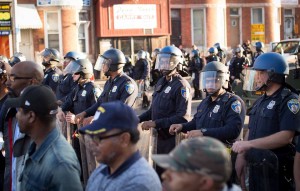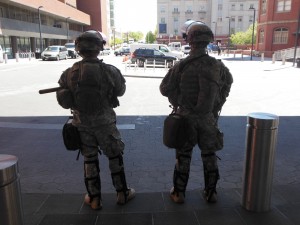Baltimore deserves better leadership
On NBC’s Meet the Press Sunday, former mayor and governor Martin O’Malley and Mayor Stephanie Rawlings-Blake.
By Barry Rascovar
For MarylandReporter.com
Baltimore deserves better. The citizens of Charm City, black and white, dutifully worked for decades to overcome obstacles of urban decline, including poverty and joblessness, with the goal of creating a thriving neo-urban, multi-racial environment attractive to residents and employers.
Those intent on achieving that dream have suffered a heartbreaking setback.
Baltimore’s younger generation of African Americans decided anger and violence were more important than taking constructive steps toward empowerment.
They seized on a failure of leadership at multiple levels and drove their inflammatory actions, like a spear, through Charm City’s armor.
Partial responsibility
The roots of this civil unrest will be analyzed for decades.
One obvious flash point could become a bone of contention in the Democratic presidential campaign. Another could dominate next year’s election for mayor.
History may record that both Martin O’Malley and Stephanie Rawlings-Blake, mayors past and present, bear partial responsibility for what went wrong in Baltimore over the last week.
O’Malley, who has set his sights on the U.S. presidency, won election in 1999 to Baltimore’s top position with the courageous support of Rawlings-Blake’s father, Del. Howard “Pete” Rawlings, one of the most influential power brokers in the Maryland General Assembly and a staunch defender of black Baltimore.
The O’Malley mayoral campaign of 1999 centered on the need for tougher police enforcement after eight years of a failed community policing policy under Baltimore’s first elected black mayor, Kurt Schmoke.
Indeed, O’Malley made a name for himself on the Baltimore City Council as a persistent critic of the soft, ineffective policing tactics put in place by Commissioner Thomas Frazier.
Discontent with violence
Baltimore is a heavily African American city. For a white to win the city’s top elected post speaks volumes about the discontent with the violence and rising crime rate in 1999. Pete Rawlings’ endorsement of O’Malley over two major black contenders proved pivotal.

Martin O’Malley came into office promising a tough law-and-order stance that would deter crime. He initiated a zero-tolerance approach based on New York City’s successful “broken windows” theory — go after petty crimes, such as vandalism or a broken window, and it would prevent more serious criminal action. Young blacks simply congregating on street corners ended up in jail on suspicion of drug dealing.
More than 100,000 arrests were made one year (in a city of 650,000). O’Malley also embraced New York City’s statistical analysis, renamed Citistat, to pinpoint crime hotspots.
The two initiatives led to a dramatic drop in law-breaking. At the time, O’Malley was lauded for his tough stance that seemed to have made Baltimore safer. It also eased the way for his reelection as mayor.
Residue of anger
But zero-tolerance sowed the seeds of discontent and bitterness among young black men. Much of the fury expressed on the city’s streets last week flowed from those mass-arrest sweeps and the targeting by police of young blacks during the O’Malley years.
His tough-on-crime approach as mayor stands in stark contrast to O’Malley’s current attempt to position himself as the ultra-liberal alternative to Hillary Clinton. Indeed, zero-tolerance policing is the antithesis of what Democratic liberals believe in.
His hard line on law enforcement could well dog O’Malley during presidential campaign debates and interviews.
His successor as mayor, Sheila Dixon, quickly discarded O’Malley’s zero tolerance strategy in favor of a more humanizing law-enforcement tool — increased on-the-street patrols and closer affiliation with community groups.
Rawlings-Blake has continued that less confrontational approach to policing.
Some now contend that the mayor’s permissiveness on that first night of clashes encouraged young blacks to engage in looting, arson and attacks on policemen and firefighters knowing there would be no crackdown.
In hindsight, the mayor’s critics may have a point. But on-the-spot decisions are easily faulted after the fact.
No rapid response
Rawlings-Blake will be dogged over the next year and a half by those who point to her failure to go after the miscreants immediately — before the violence got out of hand.

Her mystifying refusal to request help from Gov. Larry Hogan Jr. in the critical hours leading up to the outbreak of lawlessness now looks like a tragic mistake. Her standoffishness from the governor since then defies explanation.
Prior to last week’s upheaval, Rawlings-Blake looked like an easy winner in next year’s mayoral election.
That’s no longer the case — especially with the hero-worshipping status accorded Baltimore’s new state’s attorney, Marilyn Mosby, who rushed to charge six police officers with a kitchen sink of serious wrongdoing.
Winning convictions may prove infinitely harder, though, which could color the public’s perception of Mosby in the months ahead.
Former Mayor Dixon also looms as a possible contender.
Clearly, Rawlings-Blake has some serious repair work to do politically, once things return to normal in Baltimore, if she hopes to remain in the mayor’s office for another term.
Barry Rascovar’s blog is www.politicalmaryland.com. He can be reached at brascovar@hotmail.com

MarylandReporter.com is a daily news website produced by journalists committed to making state government as open, transparent, accountable and responsive as possible – in deed, not just in promise. We believe the people who pay for this government are entitled to have their money spent in an efficient and effective way, and that they are entitled to keep as much of their hard-earned dollars as they possibly can.

Are people calling Baltimore “Charm” City or by its new name: Charred City? Does Baltimore “deserve” better leadership? No, absolutely not. The people of Baltimore got exactly what they wanted out of government. Police, afraid to enforce the law, a prosecutor with great ambition listening to the mob and “justice” from the mob. No, Charred City has what it deserves and there should be an exodus.